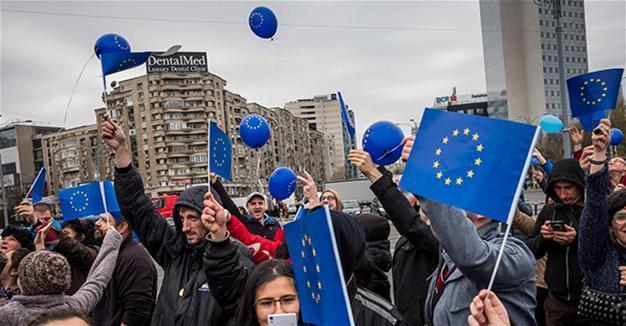European Union between hopes and anxieties
EMIL CONSTANTINESCU Former President of Romania
 In these times of crisis, Europe needs a vision that would allow us, in a rapidly changing world, to imagine even what seems unthinkable today. Only starting with this vision we can elaborate development strategies and then public policies for an election cycle for European Parliament or National Parliament. Europe needs, besides the acquis communautaire and the economic, administrative, social and military projects, to rediscover its European ethos.
In these times of crisis, Europe needs a vision that would allow us, in a rapidly changing world, to imagine even what seems unthinkable today. Only starting with this vision we can elaborate development strategies and then public policies for an election cycle for European Parliament or National Parliament. Europe needs, besides the acquis communautaire and the economic, administrative, social and military projects, to rediscover its European ethos.General Marshall, father of the economic revitalization plan for Western Europe stated by the end of the World War II that maybe the Greek philosophers would have better solutions than his political and financial contemporary experts would. In my turn, I consider Weltanschauung a concept through which the German philosophers considered that every age had its own way to see and understand the world, and that it is still productive today, especially if we see it as an Gestalt of a Weltanschauung where the whole represents more than the sum of the parties forming it. This concept corresponds best to what should be the European Union in the world of tomorrow: a complex model, showing respect to cultural, religious, ethnical identities it is comprised of.
Who can help us manage the serious challenges of the world of tomorrow, with society traumatized by the obsession of risks involved by the European integration and the globalization. The traumatized societies are those whose leaders are not able to explain either the historical projects mission, or the balance between its gains and costs. Citizens’ capacity to support important projects must not be underestimated. The European Union is the most important historical project of the 20th century and it is unique in the world history.
(...)
We are called to ask two questions. The first: what kind of Europe we build, a Europe of the civilizations interference or one of the civilization supremacy? And the second question, not less relevant: where are the European Union civilization borders? Finding a coherent answer to these questions represents one of the greatest intellectual challenges of the 21st century, as the development of the present political, economical and military European Union project will not be able to last longer without a solid, coherent and widely accepted cultural model.
That is why I believe that the long way towards a European solidarity must begin within each nation, local community or even family. There we can often find many of the contradictions we describe as typical gaps between North and South or West and East on a global perspective, and we can also identify the identity bond of a common ethos.
We speak about a common European identity founded on shared values. What are these values that define the European identity? How could be surpassed - but not forgotten - the specific characteristics and even the national limits, on the way towards a common identity? The answer to these questions lies in the very heart of the European projects, but also in European anxieties. If we continue to create projects without taking into account the inevitable anxieties involved by a political construction of half a billion inhabitants, we have poor chances to develop a powerful and democratic Europe.
















